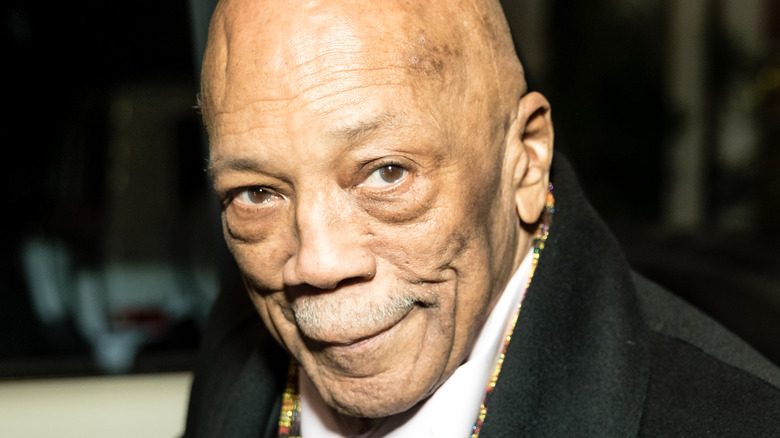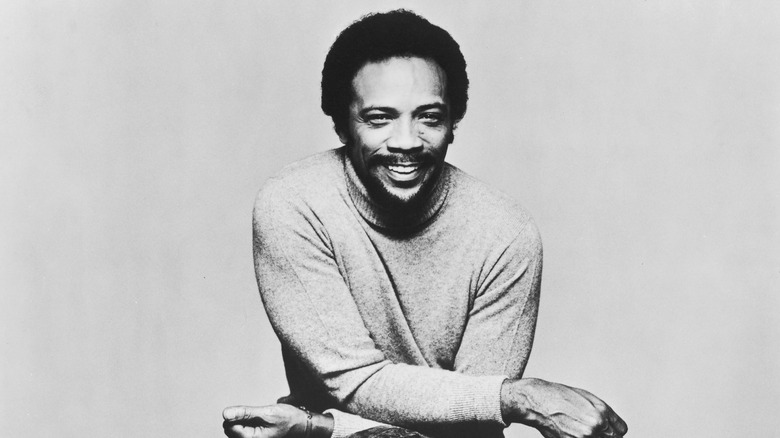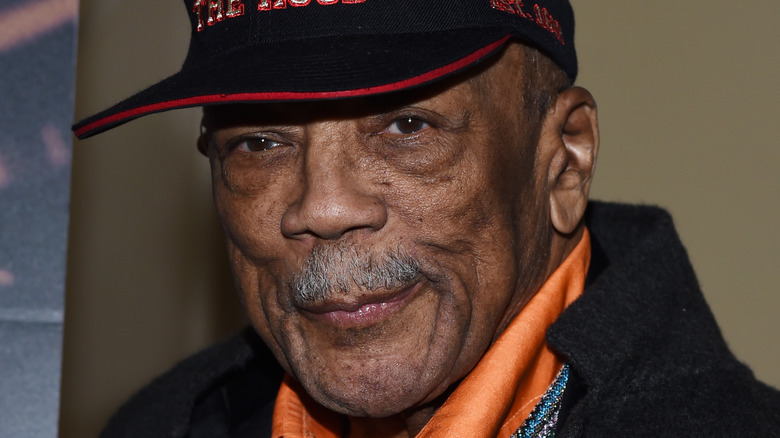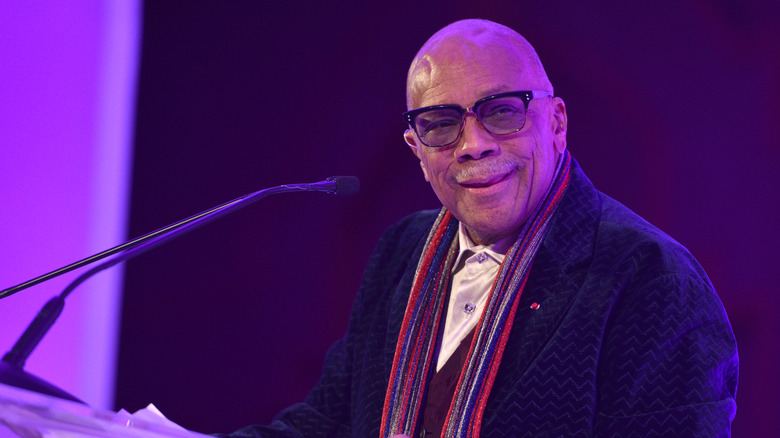Legendary Producer Quincy Jones Dead At 91
One of the most well-respected musicians and music producers of all time, Quincy Jones, died on November 3, 2024 (via AP News). He was 91. Jones died at his Bel Air home, but no cause was reported by his publicist, Arnold Robinson, who gave the following statement on behalf of Jones' family: "Tonight, with full but broken hearts, we must share the news of our father and brother Quincy Jones' passing. And although this is an incredible loss for our family, we celebrate the great life that he lived and know there will never be another like him."
In his final Instagram post, on November 2, he wished his daughter a happy birthday. After the news of his death, one commenter wrote, "What an amazing life you lived! You touched so many lives in so many ways. Rest in peace Quincy."
Born in Chicago in 1933, according to the Academy of Achievement, Jones eventually wound up in Seattle, where he met Ray Charles. The two became fast friends, and Jones began learning music from his mentor. By the time he was a teenager, he was proficient enough with his instrument that he could make a bit of money performing jazz.
He would spend the next several years on the road, before eventually transitioning from the performing side of things to the composing side. He spent a few years composing film and television music before transitioning to producing, which is where he made the biggest impact on the industry. Indeed, he actually got out of performing and into composing and producing because of poverty: "We had the best jazz band on the planet, and yet we were literally starving. That's when I discovered that there was music and there was the music business. If I were to survive, I would have to learn the difference between the two," he once said, according to Superbrass Music.
Through it all, he continued to draw from the well that was his first love: jazz. He continued to perform jazz up until 2010, when he released his final album, "Q Soul Bossa Nostra."
Jones was behind 2 of the biggest things to happen in music in the 1980s
The decade of the 1980s had its share of groundbreaking musical moments, from Live Aid to the emergence of hip-hop, and everything in between. And two of the biggest musical moments, not just of the '80s but all of pop music history — the release of one of the top-selling albums of all time and a first-of-its-kind charity record release — have Quincy Jones to thank for making them happen.
Michael Jackson's 1982 album "Thriller" has, over the decades, jockeyed with other releases for the title of the best-selling album of all time. And Quincy Jones produced it, along with Jackson's 1979 album "Off the Wall" and his 1987 release "Bad." "When I did Michael Jackson, [other jazz musicians] said, 'You sold out.' I said, 'I've been doing this all my life. What do you mean, sold out?'" he said of the accomplishment, via the Academy of Achievement.
In 1985, according to music producer and writer David Breskin, Jones used his influence to bring together various musicians to record "We Are The World" in an effort to raise money for Ethiopian famine relief.
Jones' record of industry nominations and wins is lengthy
Having spent parts of seven decades in music, it's no surprise that Jones would have racked up an impressive list of industry nominations and wins. Indeed, so lengthy is that list that it can only be discussed in outline here.
Jones has been nominated for an Academy Award seven times and won one non-competitive award (the Jean Hersholt Humanitarian Award). He was nominated for a Daytime Emmy Award four times, for which he won once. He was nominated for 79 Grammy Awards (a record, according to the industry's website), for which he won 28, tying him for second place with Alison Krauss, as well as a handful of non-competitive awards.
He's also been recognized by MTV, BET, and the Rock & Roll Hall of Fame, the latter having bestowed on him the Ahmet Ertegun Award, an honor given to non-performing professionals in the genre. In 1986, Jones received an "award" that he'd perhaps just as soon have forgotten about, taking home the Razzie for Worst Musical Score for the soundtrack for 1985's "Fever Pitch."
Jones created, managed, and donated to various charities and activism causes
Early in his career, traveling with jazz bands throughout the Jim Crow-era South, Jones experienced racism firsthand, per the Academy of Achievement. "Sometimes we'd see effigies — like black dummies — hanging by nooses from church steeples in Texas," he said, noting that on at least one occasion he slept in a funeral home due to lack of a hotel that he could stay at.
Jones directed many of his charitable efforts at elevating the station of Black people, in the U.S. and elsewhere. For example, in addition to raising money for famine-plagued Ethiopians, he also helped raise money for victims of the 2010 Haiti earthquake, according to Ability Magazine. He also created the Quincy Jones Listen Up Foundation, which built dozens of homes in South Africa in 2001. Further, the foundation was meant to connect young people with technology, education, culture, and music, and was intended to prompt an exchange of cultures between young people in L.A. and in South Africa.
Quincy Jones was married three times and had seven children from his marriages and from other relationships. His son, also named Quincy, followed his father's footsteps and became a music producer, while his daughters Rashida and Kidada both became actresses.



